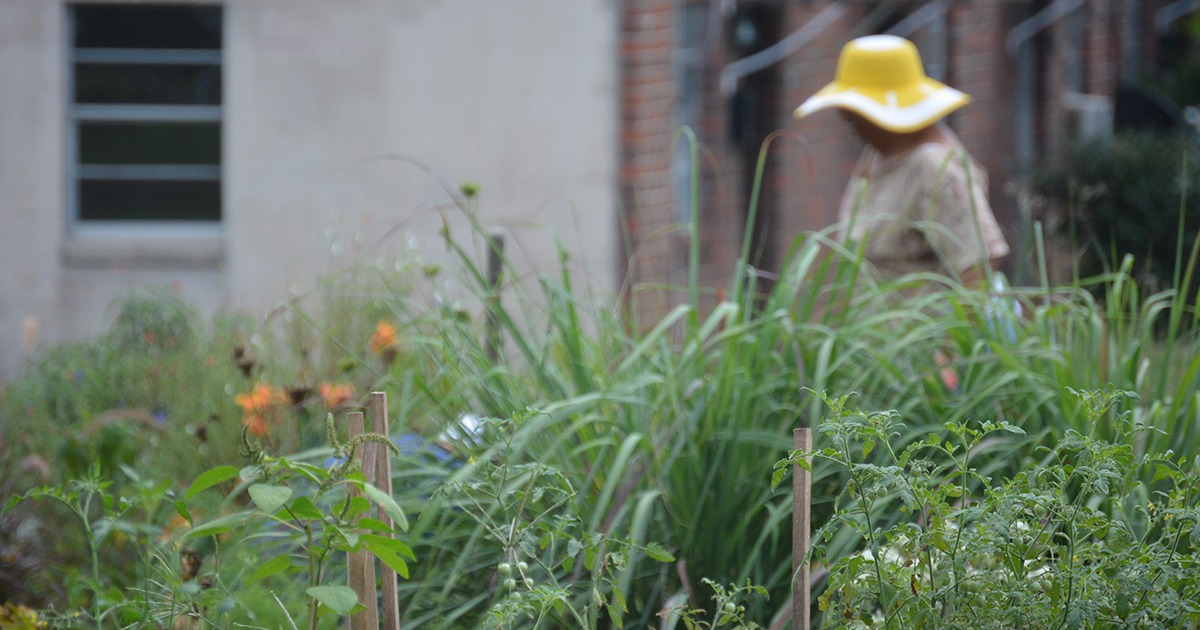English professor’s work includes service to the community as well as teaching and poetry
 Dr. Kendra Hamilton sees gardening as a metaphor for many things in life, but especially when it comes to teaching and community service.
Dr. Kendra Hamilton sees gardening as a metaphor for many things in life, but especially when it comes to teaching and community service.
“It’s sort of like the ‘Parable of the Sower.’ We just keep sowing seeds, keep sowing seeds–and hope they don’t fall on rocky ground or get scorched by the sun.
“Always looking for that good soil that can bring forth grain,” she said with a smile.
Hamilton first tried to grow flowers from seed when she was six years old.
“I think I inherited my green thumb from my maternal grandmother, who was a farm wife in Ninety-Six,” she said. “She had flowers and fruit trees and a HUGE vegetable garden, and she canned and baked and did everything the old way, from scratch.
“I was also taught by my paternal aunt, who had an amazing garden at her house in Goose Creek and taught me all the Gullah/Geechee garden ‘secrets.'”
Hamilton, English professor and director of the southern studies program, says she didn’t get a garden of her own until she was in her 40s.
“I’ve had to create and abandon several gardens I loved passionately because my work took me elsewhere,” she said.
Education, politics and service
Hamilton’s college work began at Duke University, where she earned a bachelor’s degree in English. She later earned an M.F.A. in Poetry from LSU. Her work has been published in Callaloo and The Southern Review, among other prominent Southern publications, and her book of poetry The Goddess of Gumbo was published in 2006.
Hamilton went on to earn a Ph.D. in English from the University of Virginia. Her dissertation focused on literary appropriations of the Gullah/Geechee, the language and culture of low country South Carolina. That book that emerged from that research, Romancing the Gullah, will be published by the University of Georgia Press.
Hamilton got into politics while in Charlottesville, Va. She was a member of the Charlottesville City Council from 2004 to 2007 and vice mayor of the City of Charlottesville from 2005 to 2007.
Hamilton was the managing partner in a project to redevelop the Jefferson School, a historic African American school, into a museum and cultural center. She also co-founded Bread & Roses Kitchen Garden Ministry and was on the advisory committee of the Virginia Food Heritage Project.
Serving the local community
Hamilton has continued serving the community since arriving at PC.
She was the principal investigator on “The Textile Mill Memory Project,” a three-year project funded by a $100,00 grant from the Andrew Mellon Foundation. The project visualizes 100 years of the history of Clinton as a prototypical mill town.
The project involves digitization of archival collections, photo-documentation and “story-mapping,” oral history collection, and public exhibition of materials from the Clinton, Joanna and Lydia cotton mills.
And all along Hamilton has worked in her–and the community’s–garden. A year after arriving at PC, Hamilton helped found the Clinton Community Garden on Bell Street. The idea for the project began when she met with Rev. Dr. Blake Harwell of First Baptist Church, Rev. Steven Evans, then of Friendship AME Church.
They were working on the Nat Fuller Feast, a racial reconciliation event that PC’s Southern Studies program sponsored to mark the 150th anniversary of the end of the Civil War.
“Positive energy”
“Blake wanted a way to keep the positive energy of that event going,” Hamilton said, “and so he and Steven settled on the idea of a garden as a way to bring beauty, satisfy community needs, and demonstrate what a grassrooots, interracial, intergenerational coalition might look like.
“They knew that along with my husband, Marc McVicker, a professional horticulturist, I had founded or participated in three other community gardening programs in Virginia.”
McVicker contributed the design for a dozen raised beds and with eventual plans for a covered work pavilion and community space. Rev. Evans convinced local businessman Young Dendy to donate the land in return for a “modest annual rent,” according to Hamilton. The City of Clinton installed water, and Rev. Harwell made calls to the business community and raised $13,000 to get the garden started.
“People from both churches and local community ‘do-ers’ like Susan Galloway showed up to do the work,” Hamilton said. “And things just grew from there.”
Continuing the work
A board composed of those who have been with the garden since the beginning and newcomers who are drawn to the work keep the garden going. PC students have been a part of the network from the start.
“So there are people who show up every week and community groups from churches, from the Federated Women’s Club, from local businesses, and others who come in for group work days,” Hamilton said.
They work alongside volunteers to grow “stuff people like to eat,” according to Hamilton.
Tomatoes, squash, beans and zucchini are grown in the summer. The fall garden features collards, kale, rutabagas, turnips and spinach.
“We allow people to glean according to their need,” Hamilton said. “Anything that’s left over is donated to the United Ministries or Lydia Presbyterian (Church) food banks.
“We welcome all comers. But gardens grow best when people lay their hands on them every day. People walk through the garden, sit in the garden and soak the atmosphere up, work in the garden just about every day during the growing season.”
